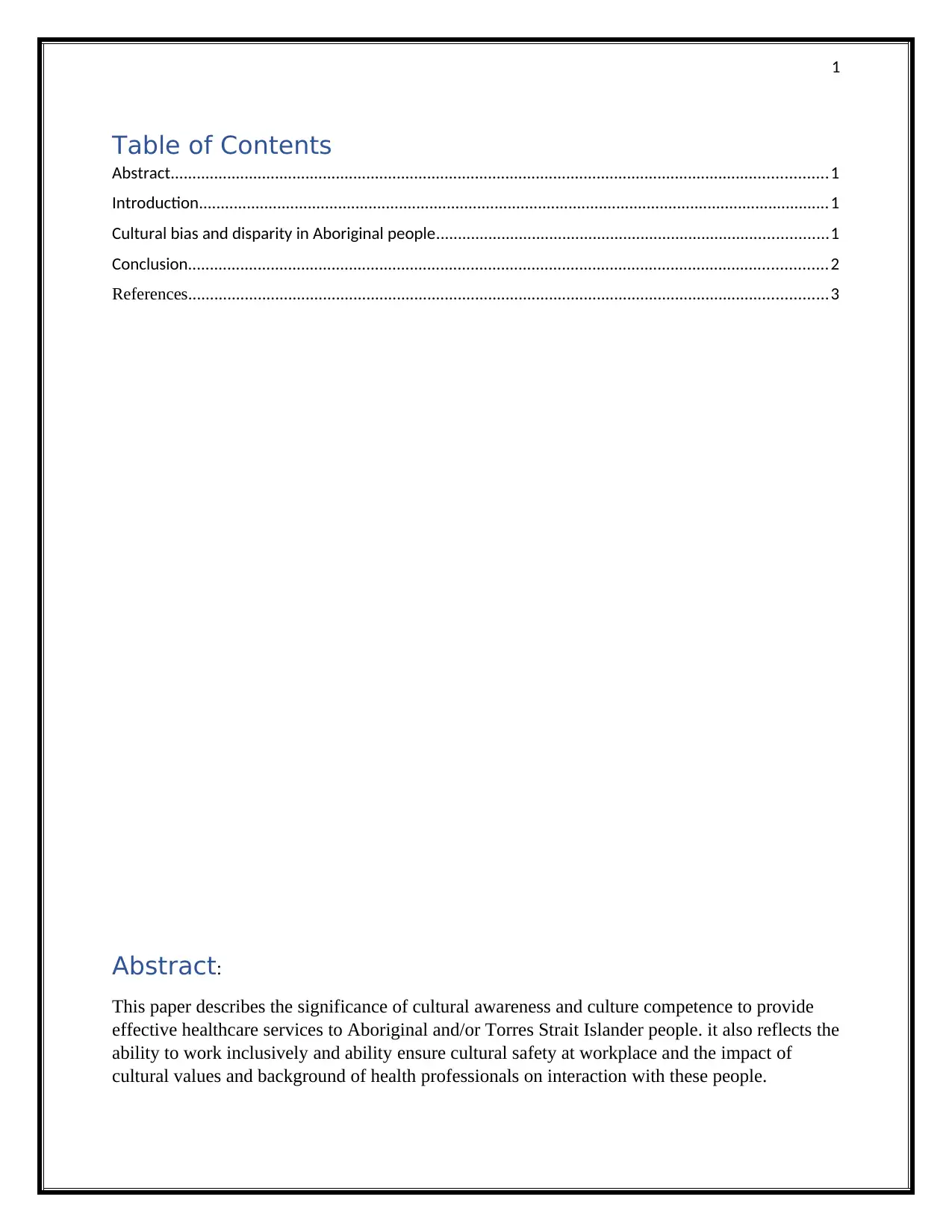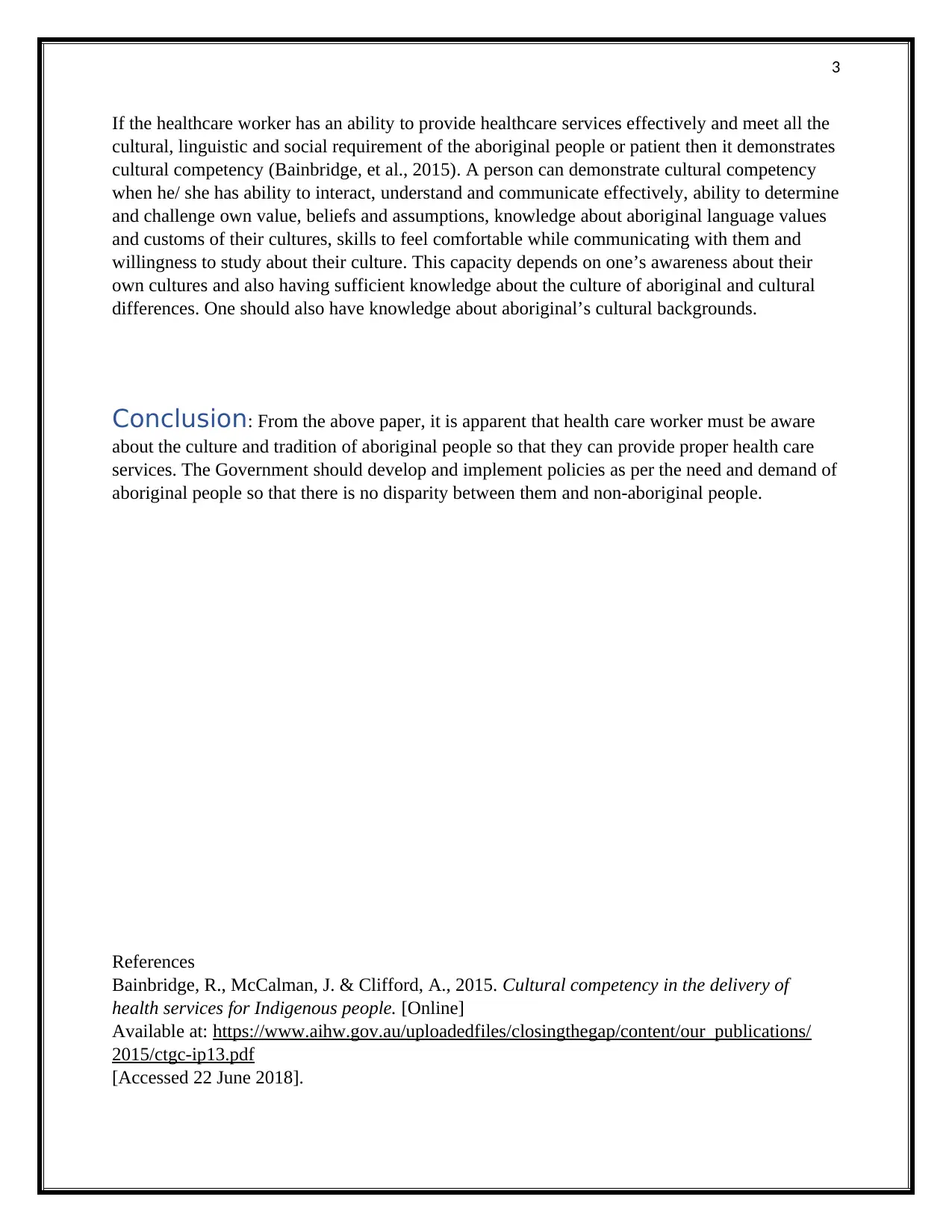Improving Healthcare: Cultural Competence for Aboriginal Australians
VerifiedAdded on 2023/06/10
|4
|955
|348
Essay
AI Summary
This essay highlights the critical role of cultural awareness and competence in delivering effective healthcare services to Aboriginal and Torres Strait Islander people. It emphasizes the impact of cultural biases and the importance of cultural safety in healthcare settings. The essay addresses the significant health inequalities faced by Aboriginal Australians, often stemming from discrimination, communication barriers, and cultural differences. It underscores the need for healthcare professionals to respect cultural diversity, practice self-awareness, and develop cultural competency by understanding Aboriginal values, beliefs, and communication styles. The paper concludes that by implementing culturally sensitive policies and practices, healthcare providers can improve health outcomes and reduce disparities between Aboriginal and non-Aboriginal populations. Desklib provides solved assignments and resources for students.

1
Table of Contents
Abstract.......................................................................................................................................................1
Introduction.................................................................................................................................................1
Cultural bias and disparity in Aboriginal people..........................................................................................1
Conclusion...................................................................................................................................................2
References...................................................................................................................................................3
Abstract:
This paper describes the significance of cultural awareness and culture competence to provide
effective healthcare services to Aboriginal and/or Torres Strait Islander people. it also reflects the
ability to work inclusively and ability ensure cultural safety at workplace and the impact of
cultural values and background of health professionals on interaction with these people.
Table of Contents
Abstract.......................................................................................................................................................1
Introduction.................................................................................................................................................1
Cultural bias and disparity in Aboriginal people..........................................................................................1
Conclusion...................................................................................................................................................2
References...................................................................................................................................................3
Abstract:
This paper describes the significance of cultural awareness and culture competence to provide
effective healthcare services to Aboriginal and/or Torres Strait Islander people. it also reflects the
ability to work inclusively and ability ensure cultural safety at workplace and the impact of
cultural values and background of health professionals on interaction with these people.
Paraphrase This Document
Need a fresh take? Get an instant paraphrase of this document with our AI Paraphraser

2
Introduction:
Cultural bias has impact on individual’s actions as perceptions are formed by one’s experiences
and cultural context. Misinterpretation may occur while working with people with different
culture so it is important to monitor, recognize and be aware of own behavior and cultural bias. It
is important for healthcare professionals to be aware of their culture as well as others to
understand to provide culture-based services.
Cultural bias and disparity in Aboriginal people:
It is apparent that there is a significant amount of heath inequalities between aboriginals and non-
aboriginals people of Australia. They face discrimination and inequalities while accessing
healthcare facilities and are mostly not treated well by healthcare professionals. Similarly, at my
workplace also they face problem while accessing services due to language and communication
barriers and cultural differences (Li, 2017).
People from different cultural background have different characteristic patterns of beliefs,
values, behaviors, attitudes, language, ways of communication and traditions and customs. These
differences between aboriginals and non-aboriginal healthcare worker may cause personality and
behavior differences such as body language, manners etc. which results to misinterpretation,
disputes and miscommunication. Therefore, culture differences may bring disparity in healthcare
or unsatisfactory health outcomes.
Language and cultural barriers are the main issues which affects the relationship and
communication with these people. Most of the aboriginal don’t use English as their first
language which creates problems in communication and establishing relationship with them. The
aboriginal people do not like being stared or direct eye contact as they consider it rude and sign
of disrespect (Dudgeon & Ugle, n.d.).
It is important for healthcare worker to respect and recognize cultural diversity and knows that
everyone should be treated equally with respect and courtesy regardless of gender, religion,
culture or beliefs. So as a healthcare professional I understand the importance of culture in
Aboriginal people and try to provide culturally competent healthcare service. I also understand
the significance of self-awareness, verbal and nonverbal communication. Therefore, I sincerely
give my full attention while communicating with them so that I can understand them properly
and there is no miscommunication or misinterpretation. Similarly, I am aware of importance of
cultural awareness of my own as well as their culture and make sure to deliver them appropriate
service to provide them with cultural safety.
The health care worker must be aware about the culture and tradition of these group of people so
that it becomes easier in delivering health care services. The aboriginal people do not like being
touched until and unless they know the person whom they are dealing with. Hence, it becomes
very important for any health care worker to first establish the relationship before providing any
service to them (Freeman, et al., 2014).
Introduction:
Cultural bias has impact on individual’s actions as perceptions are formed by one’s experiences
and cultural context. Misinterpretation may occur while working with people with different
culture so it is important to monitor, recognize and be aware of own behavior and cultural bias. It
is important for healthcare professionals to be aware of their culture as well as others to
understand to provide culture-based services.
Cultural bias and disparity in Aboriginal people:
It is apparent that there is a significant amount of heath inequalities between aboriginals and non-
aboriginals people of Australia. They face discrimination and inequalities while accessing
healthcare facilities and are mostly not treated well by healthcare professionals. Similarly, at my
workplace also they face problem while accessing services due to language and communication
barriers and cultural differences (Li, 2017).
People from different cultural background have different characteristic patterns of beliefs,
values, behaviors, attitudes, language, ways of communication and traditions and customs. These
differences between aboriginals and non-aboriginal healthcare worker may cause personality and
behavior differences such as body language, manners etc. which results to misinterpretation,
disputes and miscommunication. Therefore, culture differences may bring disparity in healthcare
or unsatisfactory health outcomes.
Language and cultural barriers are the main issues which affects the relationship and
communication with these people. Most of the aboriginal don’t use English as their first
language which creates problems in communication and establishing relationship with them. The
aboriginal people do not like being stared or direct eye contact as they consider it rude and sign
of disrespect (Dudgeon & Ugle, n.d.).
It is important for healthcare worker to respect and recognize cultural diversity and knows that
everyone should be treated equally with respect and courtesy regardless of gender, religion,
culture or beliefs. So as a healthcare professional I understand the importance of culture in
Aboriginal people and try to provide culturally competent healthcare service. I also understand
the significance of self-awareness, verbal and nonverbal communication. Therefore, I sincerely
give my full attention while communicating with them so that I can understand them properly
and there is no miscommunication or misinterpretation. Similarly, I am aware of importance of
cultural awareness of my own as well as their culture and make sure to deliver them appropriate
service to provide them with cultural safety.
The health care worker must be aware about the culture and tradition of these group of people so
that it becomes easier in delivering health care services. The aboriginal people do not like being
touched until and unless they know the person whom they are dealing with. Hence, it becomes
very important for any health care worker to first establish the relationship before providing any
service to them (Freeman, et al., 2014).

3
If the healthcare worker has an ability to provide healthcare services effectively and meet all the
cultural, linguistic and social requirement of the aboriginal people or patient then it demonstrates
cultural competency (Bainbridge, et al., 2015). A person can demonstrate cultural competency
when he/ she has ability to interact, understand and communicate effectively, ability to determine
and challenge own value, beliefs and assumptions, knowledge about aboriginal language values
and customs of their cultures, skills to feel comfortable while communicating with them and
willingness to study about their culture. This capacity depends on one’s awareness about their
own cultures and also having sufficient knowledge about the culture of aboriginal and cultural
differences. One should also have knowledge about aboriginal’s cultural backgrounds.
Conclusion: From the above paper, it is apparent that health care worker must be aware
about the culture and tradition of aboriginal people so that they can provide proper health care
services. The Government should develop and implement policies as per the need and demand of
aboriginal people so that there is no disparity between them and non-aboriginal people.
References
Bainbridge, R., McCalman, J. & Clifford, A., 2015. Cultural competency in the delivery of
health services for Indigenous people. [Online]
Available at: https://www.aihw.gov.au/uploadedfiles/closingthegap/content/our_publications/
2015/ctgc-ip13.pdf
[Accessed 22 June 2018].
If the healthcare worker has an ability to provide healthcare services effectively and meet all the
cultural, linguistic and social requirement of the aboriginal people or patient then it demonstrates
cultural competency (Bainbridge, et al., 2015). A person can demonstrate cultural competency
when he/ she has ability to interact, understand and communicate effectively, ability to determine
and challenge own value, beliefs and assumptions, knowledge about aboriginal language values
and customs of their cultures, skills to feel comfortable while communicating with them and
willingness to study about their culture. This capacity depends on one’s awareness about their
own cultures and also having sufficient knowledge about the culture of aboriginal and cultural
differences. One should also have knowledge about aboriginal’s cultural backgrounds.
Conclusion: From the above paper, it is apparent that health care worker must be aware
about the culture and tradition of aboriginal people so that they can provide proper health care
services. The Government should develop and implement policies as per the need and demand of
aboriginal people so that there is no disparity between them and non-aboriginal people.
References
Bainbridge, R., McCalman, J. & Clifford, A., 2015. Cultural competency in the delivery of
health services for Indigenous people. [Online]
Available at: https://www.aihw.gov.au/uploadedfiles/closingthegap/content/our_publications/
2015/ctgc-ip13.pdf
[Accessed 22 June 2018].
⊘ This is a preview!⊘
Do you want full access?
Subscribe today to unlock all pages.

Trusted by 1+ million students worldwide

4
Dudgeon, P. & Ugle, K., n.d. Communicating and Engaging with Diverse Communities. [Online]
Available at: https://www.telethonkids.org.au/globalassets/media/documents/aboriginal-health/
working-together-second-edition/wt-part-3-chapt-15-final.pdf
[Accessed 22 June 2018].
Freeman, T., Edwards, T., Baum, F. & Lawless, A., 2014. Cultural respect strategies in
Australian Aboriginal primary health care services: beyond education and training of
practitioners. Australian and New Zealand Journal of Public Health, 34(8), pp. 355-361.
Li, J., 2017. Cultural barriers lead to inequitable healthcare access for aboriginal Australians and
Torres Strait Islanders. NCBI, 4(4), pp. 207-210.
Dudgeon, P. & Ugle, K., n.d. Communicating and Engaging with Diverse Communities. [Online]
Available at: https://www.telethonkids.org.au/globalassets/media/documents/aboriginal-health/
working-together-second-edition/wt-part-3-chapt-15-final.pdf
[Accessed 22 June 2018].
Freeman, T., Edwards, T., Baum, F. & Lawless, A., 2014. Cultural respect strategies in
Australian Aboriginal primary health care services: beyond education and training of
practitioners. Australian and New Zealand Journal of Public Health, 34(8), pp. 355-361.
Li, J., 2017. Cultural barriers lead to inequitable healthcare access for aboriginal Australians and
Torres Strait Islanders. NCBI, 4(4), pp. 207-210.
1 out of 4
Related Documents
Your All-in-One AI-Powered Toolkit for Academic Success.
+13062052269
info@desklib.com
Available 24*7 on WhatsApp / Email
![[object Object]](/_next/static/media/star-bottom.7253800d.svg)
Unlock your academic potential
Copyright © 2020–2026 A2Z Services. All Rights Reserved. Developed and managed by ZUCOL.




